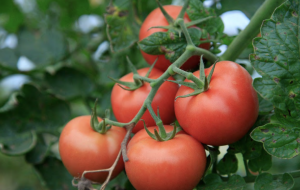UWO community garden to expand
February 16, 2022
The UW Oshkosh Community Garden project will expand for the 2022 growing season, including six new garden beds, and Community Garden interns will be recruiting students and clubs to rent garden space in early spring.
“We are hoping to increase student participation in the gardens by partnering with clubs and orgs,” said Kevin Crawford, a UWO chemistry professor and faculty adviser for the Community Garden.

Tomatoes are one of the various vegetables found in the community garden on the UW Oshkosh campus. Additional garden beds will support even more produce.
The garden, located at 663 W. Third Ave., was started in 2006 by a group of students who were interested in providing fresh, local food for themselves and the community. The goal was to build a community around a shared interest in gardening and food.
Typically, the garden is open from April to October. “Students are given the first chance to participate, then faculty/staff and community members,” Crawford said.
In the past, tomatoes, peppers, beans, chard, broccoli, peas, basil and kale have been successfully grown in the garden, with participants also experimenting with growing carrots, onions, radishes and squash.
Although the garden is not certified organic, the gardeners use practices parallel to organic gardening instead of pesticides. Those who rent space also agree to avoid pesticides unless they ask permission.
Currently, there are 33 garden beds, approximately 30 square feet each. The six additional beds will allow clubs/organizations to participate as a group.
“We are interested in seeing whether gardening can help student clubs and orgs with their missions and goals,” Crawford said.
Since 2018, the UWO Sustainability Institute for Regional Transformations (SIRT) has been managing the garden. Participants pay a small fee to rent out space. After signing a rules agreement, renters can start working in their designated space. Student interns and faculty advisers work to maintain the beds and common spaces throughout the season.
“Each season, the garden produces hundreds of pounds of fresh produce, and excess food is typically offered to SIRT members or donated to local food pantries or community refrigerators,” Crawford said. “We hope to continue growing student involvement and providing fresh produce for the local community.”













